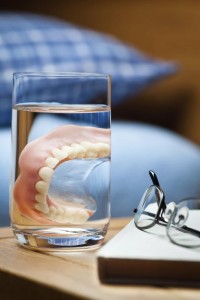
There are two different kinds of dentures to help replace your missing teeth. For more information visit your Catonsville Dental Care Dentist!
Dentures can give you a new lease on life, improving not only your quality of life but how you feel about your smile. But what are dentures exactly and how can they help you? Let’s take a look!
What are Dentures?
Dentures are a removable replacement system for missing teeth and the surrounding tissues. There are two different kinds of dentures: partial and complete dentures. Each of these style dentures have different benefits as well as drawbacks.
Partial Dentures
Partial dentures are usually used as a replacement for missing teeth. They are usually attached to a gum-colored plastic base that can be connected by metal framework that holds the piece into place. Partial dentures are generally used when one or more natural teeth remain on the upper or lower jaw. These dentures are usually put into place using a fixed “bridge” before being cemented into place. Not only does a partial denture fill the spaces but they also prevent other teeth from changing position. One of the major drawbacks of partial dentures is the accelerated rate of plaque buildup that can occur around your natural teeth. This plaque carries bacteria that causes tooth decay and gum disease. These dentures can also put pressure on your teeth and gums, which can cause trauma to your natural teeth. This trauma can cause you to lose more teeth, meaning you will not have anything to hold your partial denture into place. If this is the case, you will have to replace your partial denture. They also may not function as well as a fixed tooth replacement option like an implant or bridge.
Complete Dentures
Complete dentures can be classified into two styles: conventional and immediate dentures. These dentures are made after all the teeth have been removed and the gum tissue has started to heal. Immediate dentures can be made in advanced and positioned as soon as the teeth are removed. This makes the transition from teeth to dentures easier as the patient doesn’t have to be without teeth for any length of time. A disadvantage of immediate dentures is the adjustments that will need to be made in order for them to fit properly during the healing process. They are considered a temporary solution while conventional dentures are for the long term. Conventional dentures are custom made and can take four to five appointments to fit to ensure they fit correctly and look natural. They do need periodic adjustments to continue their excellent fit.
Both types of dentures have their advantages and disadvantages. To see if dentures are the best option for you, talk to your Catonsville Dental Care dentist today!
Leikin & Baylin Dental Care of Catonsville
Regularly seeing your Catonsville Dental Care dentist will help to determine if you are in need of a fluoride treatment. For more information on fluoride treatments as well as other preventative dental care services, call Catonsville Dental Care today! Call today at 410-747-1115, or submit any questions by visiting CatonsvilleDentalCare.com.
Disclaimer: The writer of this article is not a medical professional. Information contained herein has been collected from sources believed to be reliable, and every precaution has been taken to ensure its accuracy. The information provided here is for general informational purposes only, and should not be used as a substitute for professional medical care.
